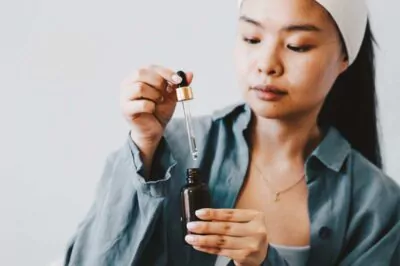Table of Contents[Hide][Show]
Vitamin C is a powerful and popular antioxidant often found in many skin care products, like serums, moisturizers and masks. With its multitude of benefits for the skin, including brightening, improving the appearance of fine lines and wrinkles and helping to protect the skin from environmental stressors, it’s no wonder vitamin C can be found almost everywhere in the beauty world.
However, some people have experienced that vitamin C can cause their skin to darken. This may come across as confusing since vitamin C products typically tout their benefits for illuminating one’s complexion. So, does vitamin c darken skin? Let’s dive into the details below!
The Controversy of Vitamin C Darken or Stain the Skin?
Now, to cover the main concern many wonder—if Vitamin C causes skin darkening or if vitamin C stains the skin. To answer this, we need to look at a few factors.
Does Vitamin C Cause Skin Darkening?
Well, not permanently. Instead, vitamin C can cause temporary skin staining (also known as hyperpigmentation), which happens when l-ascorbic acid (the most common form of vitamin C and one that is less shelf-stable) oxidizes and turns into erythrulose (a key ingredient in many self-tanner products).
This process of degradation occurs when the byproducts of oxidized l-ascorbic acid react with proteins on the surface and give the uppermost layers of your skin a darker color. That is, however, until they are exfoliated and polished off.
So, while certain types of vitamin C can produce this effect temporarily, overall, vitamin C has been shown to actually have a brightening effect on the skin, which can help to even out skin tone and reduce the appearance of dark spots. Just make sure to use a high-quality vitamin C derivative and products. Read more about the different types of vitamin C to see which type is best for your skin.
Do Natural Colors of Vitamin C Serums Stain the Skin?
Vitamin C serums often have a slight coloration, ranging from clear to light yellow or amber. This color can be attributed to the way the vitamin C is formulated, and how the ingredient itself is processed. It may be assumed that the darker colored variations of this ingredient can cause staining, but that is not true. When applied in moderation and absorbed properly, the color of the serum should not linger on your skin.
Quality of the Product Matters
The quality of the Vitamin C serum you choose plays a significant role. High-quality serums are designed to be easily absorbed by the skin, leaving no residue or color behind. Lower-quality products may have stability issues, leading to changes in color and potentially staining.
Properly Apply Your Vitamin C Serum
To ensure vitamin C does not stain your skin, it’s essential to apply it correctly. Before applying, hydrate the skin with a toner. Pump a few drops of your vitamin C serum into your hand and evenly distribute along your face. A little goes a long way. Massage it into your skin gently and allow it to absorb fully before applying other skin care products.
Preventive Measures and Tips
If you want to ensure that Vitamin C doesn’t stain your skin, here are some preventive measures and tips to consider:
- Patch Test: Before using a new vitamin C product, perform a patch test on a small area of your skin to check for any adverse reactions or staining.
- Quality Products: Invest in high-quality vitamin C serums from brands you trust with stable forms of vitamin C to minimize the risk of staining.
- Proper Application: Apply the serum sparingly and evenly, allowing it to absorb fully into your skin before moving on to other skin care steps.
- Wash Hands: After applying the serum, wash your hands thoroughly to prevent any potential transfer of color.
How Does Vitamin C Help Your Skin?

Vitamin C plays many roles in benefitting the skin and with the combination of these efforts, your skin thrives appearing strong, youthful and radiant. Below are some of the top benefits you can see when using vitamin C, which include protecting, plumping and brightening your skin.
Protects skin from environmental stressors
Vitamin C helps to protect your skin from environmental stressors by neutralizing impact from variables outside of our control (like harsh elements and pollution). With its rich antioxidant quality, applying vitamin C topically supports the skin’s natural defense, so that you have a fortified and healthy-looking skin barrier.
Plumps skin
Additionally, it helps to boost the look of skin plumpness, reducing the appearance of large pores, as well as the look of wrinkles and fine lines. With consistent use of a well-sourced vitamin C skin care elixir, say hello to bouncy-looking, supple skin!
Brightens skin
Vitamin C, most notably known to brighten skin, helps by inhibiting tyrosinase which is tied to melanin production. This inhibition helps to reduce the appearance of dark spots for an overall, more even-toned glow. (You can find vitamin C-powered products in our brightening skin care collection!)
Does Vitamin C Serum Help With Dark Spots?
Because vitamin C is a wonderful brightening ingredient (inhibiting tyrosinase as we covered above), it does wonders to reduce the appearance of dark spots and reveal a more even-toned complexion. This is especially possible when applied topically in the form of a serum. Serums are aqueous-based solutions teeming with activated ingredients that work synergistically together to deliver amazing nutrients and benefits to the skin. Since serums are hydrators, their molecular size is smaller compared to their oil-based counterparts, which allows them to drive deeper into the skin layers for a more targeted approach.
Can Vitamin C Lighten Your Skin?
While vitamin C helps with brightening your skin, it will not lighten your general skin shade. The inhibition of excess color helps with evening out the look of darkened areas, which creates a smooth, uniform complexion.
Conclusion

In short, the concern about Vitamin C staining your skin is less worrisome than it sounds. Avoid vitamin C serums that are close to oxidizing or already oxidized to prevent the potential, temporary stain. If you happen to have used one already, simply incorporate an exfoliation session to deeply cleanse the face. Otherwise, use high-quality serums with gentle and stable vitamin C to avoid this problem altogether. You may notice temporary coloration from vitamin C serums with natural ingredients, but this can easily fade as the serum is properly massaged into the skin and absorbed.
Overall, incorporating a high-quality vitamin C product can be an effective way to brighten the complexion and achieve a more radiant and youthful appearance. With so many forms out there on the market, it is important to do your research and find which vitamin C form works best for you and your skin type.
You can look for products that harness ingredients from nature abundant in vitamin C like kakadu plum, or safe yet effective vitamin C derivatives like tetrahexyldecyl ascorbate. We may be biased here, but we really believe this to be one of the best and gentlest forms of vitamin C available, making it a great option for all skin types, especially if you’re wondering if vitamin C serums are suitable for those with sensitive skin types!








Leave a Reply